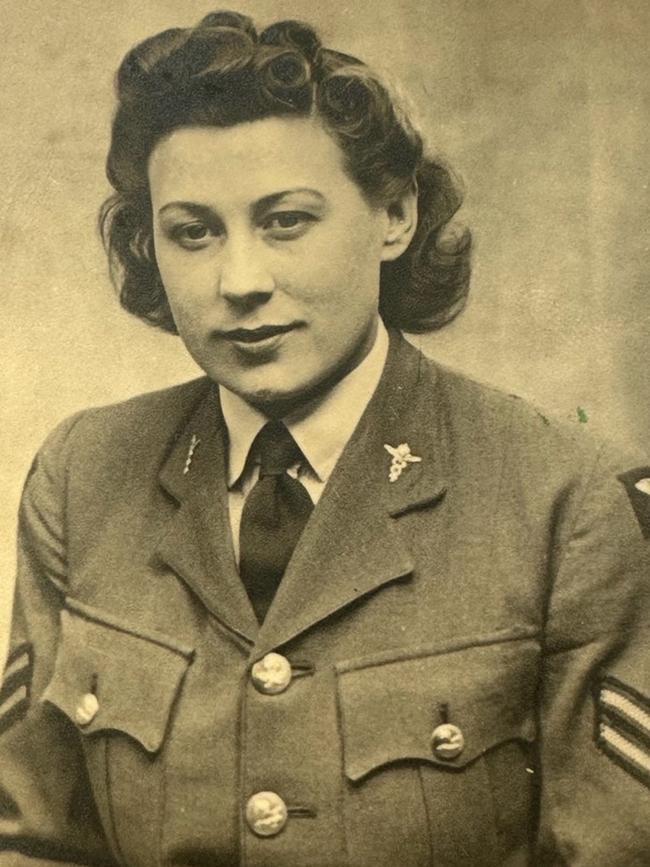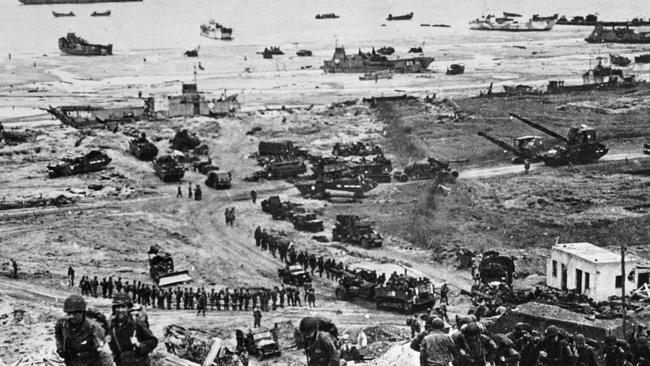D-Day 80th anniversary: Florence Nightingale Museum in London honours air force medical assistant Phyllis Bull
A London museum which celebrates the work of the best known figures in nursing history is telling the captivating story of one medical assistant to commemorate the 80th anniversary of D-Day.
World
Don't miss out on the headlines from World. Followed categories will be added to My News.
“Phyllis, don’t come – not this time,” a senior officer told air force medical assistant Phyllis Bull, secretly knowing her air gunner boyfriend Bernard had been killed in a plane crash.
The 23-year-old first responder, who was full of courage and pride when she joined the Women’s Auxiliary Air Force (WAAF) as an orderly in 1942, knew the terrible danger she faced in the bombing raids.
But it came to a very personal head when she was forbidden from attending the scene of that shot-down plane near an RAF air base in Yorkshire in Northern England.
“She was initially told ‘don’t come’ and was later informed her boyfriend, who was a wireless operator gunner, had died returning to his air base either from aerial combat or from a scouting mission,” Hannah Amos, collections manager at The Florence Nightingale Museum at London’s St Thomas’s Hospital, said.
The museum is telling Phyllis’s story to commemorate the 80th anniversary of D-Day, when allied forces mounted the largest amphibious invasion in military history.
“She would have been devastated and terrified, it was a heart breaking start to her war career,” she said.


A year after that tragedy, trained as a nurse in the style of Florence Nightingale, Phyllis had been promoted to corporal and was posted to RAF Marston Moor in North Yorkshire, where she encountered more tragedies of World War II as an air ambulance orderly saving lives during heavy bombing raids from the German Luftwaffe.
Soon after, on June 13, 1944, Phyllis went on to make history when she became one of the first of four British women dispatched to a combat zone in a trial of the “Flying Nightingales” – air ambulance nurses who ferried supplies on military aircraft and evacuated injured servicemen after the D-Day landings in Normandy, in northern France.
The stories of the four women who put their lives on the line to help bring home more than 100,000 casualties from mainland Europe – Phyllis, Myra Roberts, Lydia Alford and Edna Birbeck – are remembered as part of the exhibition to run until December entitled In Focus: The Florence Nightingales at the hospital that was previously an important medical treatment centre for wartime casualties returning from D-Day landings.
A week after the D-Day operation of June 6, 1944 – the operation codenamed OVERLORD, which saw 156,000 Allied soldiers arrive at Normandy and ultimately go on to liberate France from the Nazis – Phyllis and her three fellow conscripts were told they were flying to France the next morning to deliver supplies and evacuate casualties.

Full scale evacuation operations were launched on June 18, 1944, when 11 Dakotas were sent to Normandy. They landed at Beny-Sur-Mer and were packed with 183 men. Almost one hundred more Dakotas flew out days later. By the end of the month, more than 1559 wounded soldiers had been evacuated from Normandy, thanks to the Flying Nightingales who delivered lifesaving treatment and munitions, keeping many of the men alive until they could access lifesaving surgery.
Phyllis survived the war and gave up her nursing carer to marry and have a family.
In a book entitled We Also Were There, which recounts in part Phyllis’s story, she talked of her first experience of a crash on a station sports day when she saw a Liberator bomber doing evasive exercises with a Spitfire lose its tail plane and crash land in a nearby cornfield.
Arriving with an ambulance crew to the smouldering plane, they extinguished the fire before removing the charred bodies and flying them back to sick quarters to be laid out.
“This was the first time I had experienced death at first hand, and it was an overwhelming experience for me, but I was determined to do all I could for these brave young men, even if it was only to be reverent in dealing with their broken bodies,” Phyllis recalled in the book.
“The male orderlies always played ‘tough’ in these circumstances, and we girls were not going to show weakness in front of them.
“When it was all done, I went quietly away and shed my tears. I could hear the radio playing in the wards from John Bunyan’s ‘And the trumpets sounded for them on the other side’. I hoped it was true – a strange coincidence.”
Her daughter Rosemary Smeeton talks with immense pride when she thinks of the courage her mother summoned to bring soldiers home after the allied troops had secured the beachheads.
“I’m so proud of mum,” she said.
“My grandmother Edith Bull was a widow; her husband died in 1930 of stomach cancer when my mother was nine.

“Mother would’ve loved to have gone to grammar school but stayed on in the village school until she was 15 and helped educate the younger children in her final year.
“The war gave her the opportunity to leave poorly paid and unpleasant jobs and join the Women’s Auxiliary Air Force.
“She experienced sad stories as a nursing orderly. I’m so proud of what she did, what she achieved.”
Fellow corporal Lydia Alford’s recollection of her training at RAF Hendon, in north London, also features at the exhibition.
“Within weeks of applying, I was sent on an intensive air ambulance training course, this included instruction in the use of oxygen, injections, learning how to deal with certain type of injuries such as broken bones, burns and colostomies, and how to cope with the effects of air travel and altitude,” she said in extracts sourced by the museum.
“When I had completed the course I was posted to RAF Blakehill Farm, near Cricklade. The training continued with a ‘brush up’ course at the RAF hospital at Wroughton, dinghy drill in the swimming pool at Bath, and several hours of flying experience often on glider exercises.
“These were pretty terrifying, as they were carried out with the cargo door removed, and when the glider was released the whole plane juddered.”

Leading Aircraftswoman Myra Roberts recalled that not all the Dakota pilots were pleased to have women on board.
“The pilot of the Dakota in which I did my training flights was Scottish, Warrant Officer Jock McCannell,” she said.
“After the first few trips I had the feeling he didn’t want me there and eventually I asked why. He said it was nothing personal, that he’d come from a fishing family and fishermen would never put out to sea with a woman aboard as it was bad luck. During that first week in June, us women were grounded, while all the planes took part in the landings.
“Jock’s was one of the few that didn’t return and I thought of the women in the boat.”
Of the 200 Nightingales, two lost their lives.
Only seven lived long enough to receive official recognition for their bravery.
Originally published as D-Day 80th anniversary: Florence Nightingale Museum in London honours air force medical assistant Phyllis Bull





